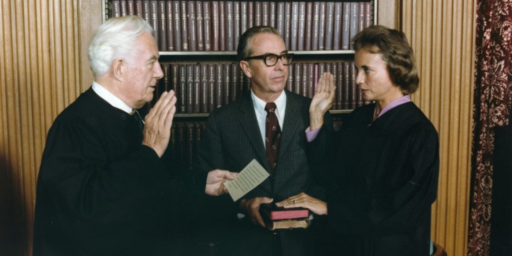Supreme Court Reinstates N.H. Abortion Law–for Now
The Supreme Court today let New Hampshire’s law requiring parental notification for abortion stand, declining to rule on narrow, procedural grounds.
The Supreme Court steered clear of a major ruling on abortion Wednesday, instead giving New Hampshire a chance to save its parental notification law. Justices, in a rare unanimous abortion ruling, agreed that the New Hampshire law could make it too hard for some ill minors to get an abortion, but at the same time they were hesitant about stepping in to fix the statute. They told a lower court to reconsider whether the entire law is unconstitutional. “Making distinctions in a murky constitutional context, or where line-drawing is inherently complex, may call for a `far more serious invasion of the legislative domain’ than we ought to undertake,” retiring Justice Sandra Day O’Connor wrote for the court.
The New Hampshire case had been expected to be much closer at the high court. Instead, justices found consensus on narrow grounds, that a lower court went too far by permanently blocking the law that requires a parent to be told before a daughter ends her pregnancy. Civil rights groups predicted that the appeals court would again strike down the law. “It tells politicians that they must include protections for women’s health and safety when they pass abortion laws,” said Jennifer Dalven, an attorney with the American Civil Liberties Union.
[…]
The court had been asked to consider whether the 2003 law put an “undue burden” on a woman in choosing to end a pregnancy. O’Connor is an architect of the undue burden standard, and was the deciding vote in the last abortion case five years ago, when the justices ruled that a Nebraska law banning a type of late-term abortion was too burdensome. That law did not have an exception to protect the mother’s health. Justices did not deal directly with that question, although O’Connor wrote: “under our cases it would be unconstitutional to apply the act in a manner that subjects minors to significant health risks.”
The opinion, just 10 pages, was a victory for New Hampshire in a case that had been closely watched by other states with restrictions. Justices had been told that 24 states mandate a parent’s approval and 19, including New Hampshire, demand parental notice. “In the case that is before us … the lower courts need not have invalidated the law wholesale,” O’Connor wrote. “Only a few applications of New Hampshire’s parental notification statute would present a constitutional problem.”
Both sides will claim victory in this one. Oddly, the AP headline that accompanies the story, “Supreme Court Affirms N.H. Abortion Law,” gives it to the pro-life side. [Update: More interestingly, the headline was previously “Supreme Court Dodges Big Abortion Ruling,” according to Howard Bashman. That was more accurate.]
In fact, the Court was issuing a technical order to a lower court to try again with the mindset of letting stand as much of the law as passes constitutional muster. Almost certainly, given decades of Supreme Court precedent, the parental notification requirement will be struck down absent a “health of the mother” exception.
Lyle Denniston puts it exactly right: “The Supreme Court on Wednesday gave New Hampshire a new chance to salvage — though in a narrower form — its law requiring that parents be notified if their teenaged daughter is seeking an abortion.” He speculates, though, that it could be signal news for the pro-life movement:
Read most broadly, though, the opinion could be understood as laying down a new limit on lower court judges’ authority to issue sweeping decisions that nullify new abortion laws, end to end. It quite clearly calls for a much more discrete, refined review of the ways in which a law might be enforced validly. If, in fact, that is the way the decision is applied by lower courts in this and other cases, it could amount to a narrowing of abortion rights. That is because it would amount as a legal matter to less reliance upon an individual doctor’s professional judgment in individual cases, especially when the abortion option is not considered in a truly emergency situation, but is only deemed medically advisable for a given patient.
[…]
The Court ruling Wednesday noted that, of the 44 states with laws requiring some parental role on teenage abortions, only New Hampshire and three others make no exception “for minors’ health in an emergency.” The others are Minnesota, Missouri and Wyoming. The Court stressed, as it had before, that states do have the right to require parental involvement. “We cast no doubt” on that in the new ruling, O’Connor wrote.
Such laws, under the Court’s past precedents, must include a parental “bypass,” allowing a pregnant minor to seek approval of a judge for an abortion when bringing in the parents would not be in the girl’s best interests. Such a bypass procedure must be rapid and confidential. The challenge to New Hampshire’s law included a claim that the statute’s judicial bypass does not provide sufficient confidentiality — an issue that the Court said may arise again as the case proceeds further in lower courts.
Only time will tell. The Constitution is 217 years old but its invisible abortion section is only partly formed.





Read most broadly, though, the opinion could be understood as laying down a new limit on lower court judges’ authority to issue sweeping decisions that nullify new abortion laws, end to end.
Wow, and they ruled 9-0, huh? That evil Bush! He’s infected the liberal wing of the court with his anti-abortion, strict constructionist mumbo jumbo!
“bypass” is better read “this law is a farce”if the parents are so dangerous that their involvement would not be in the “girl’s best interests”[sic]then the “DCFS” should certainly never let them regain custody afterward. that clause simply means that children are wards of the state from birth.for those of you who want more state interference in families, remember this irrefutable fact; it is impossible for any government to care about anyone for even a moment.